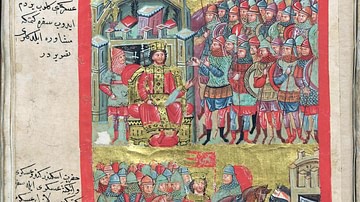Search
Search Results

Article
Women in the American Revolution
In Colonial America, women were discouraged from taking an interest in politics and were instead expected to focus only on traditionally 'feminine' matters, such as homemaking and childrearing. However, such gender roles were challenged during...

Definition
Empire of Nicaea
The Empire of Nicaea was a successor state to the Byzantine Empire, or rather a Byzantine Empire in exile lasting from 1204 to 1261 CE. The Empire of Nicaea was founded in the aftermath of the sacking of Constantinople during the Fourth Crusade...

Article
Women in Ancient Mesopotamia
The lives of women in ancient Mesopotamia cannot be characterized as easily as with other civilizations owing to the different cultures over time. Generally speaking, though, Mesopotamian women had significant rights, could own businesses...

Definition
Empire of Trebizond
The Empire of Trebizond was an offshoot of the Byzantine Empire that existed from 1204 to 1461 CE, ruled by the Megas Komnenos Dynasty, descendants of the Komnenos Byzantine emperors. The Empire of Trebizond has been far less researched than...

Article
Spartan Women
Spartan women had more rights and enjoyed greater autonomy than women in any other Greek city-state of the Classical Period (5th-4th centuries BCE). Women could inherit property, own land, make business transactions, and were better educated...

Article
Society in the Byzantine Empire
The society in the Byzantine Empire (4th-15th century CE) was dominated by the imperial family and the male aristocracy but there were opportunities for social advancement thanks to wars, population movements, imperial gifts of lands and...

Article
Pizan's The Status of Women & the Reformation
The Book of the City of the Ladies (1405) by Christine de Pizan (l. 1364 - c. 1430) is considered by many scholars to be the first work of feminist literature, predating A Vindication of the Rights of Women (1792) by Mary Wollstonecraft by...

Article
Women in the Mongol Empire
Women in the Mongol Empire (1206-1368 CE) shared the daily chores and hardships of steppe life with men and were largely responsible for tending animals, setting up camps, childrearing, producing food and cooking it. Having rather more rights...

Article
The Differences Between Byzantine & Armenian Christianity
Although both the Byzantines and the Armenians were Christian, the types of Christianity they professed had important differences that led to a lack of recognition and tensions between the two groups and a considerable part of their relationship...

Article
Trade in the Byzantine Empire
Trade and commerce were essential components of the success and expansion of the Byzantine Empire. Trade was carried out by ship over vast distances, although for safety, most sailing vessels were restricted to the better weather conditions...